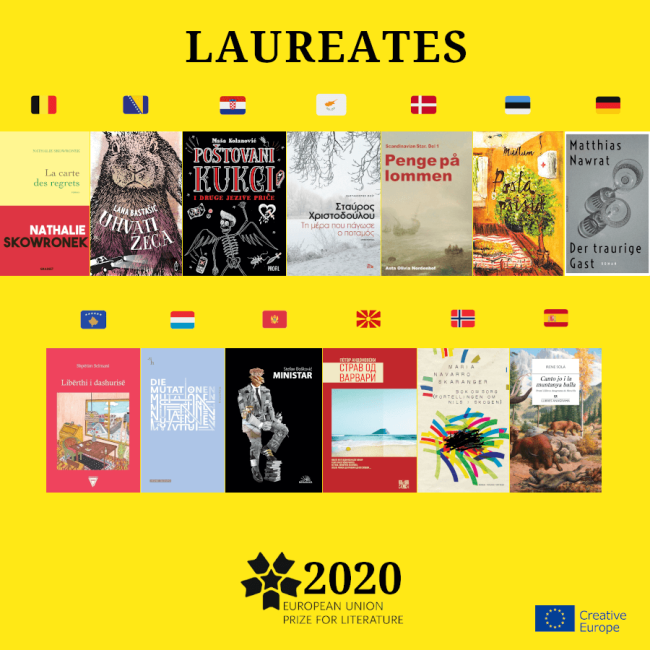
The European Union Prize for Literature (EUPL) recognises emerging fiction writers from across Europe. During a cycle of three years, the award includes 41 countries participating in the Creative Europe programme – an initiative aiming at strengthening Europe’s cultural and creative sectors. The EUPL was launched in 2009, and since then it has recognised 122 writers, through 11 editions.
We are pleased to announce the thirteen laureates of the 2020 edition:
• Nathalie Skowronek, La carte des regrets (The map of regrets), for Belgium (French-speaking)
• Lana Bastašić, Uhvati zeca (Catch the rabbit), for Bosnia and Herzegovina
• Maša Kolanović, Poštovani kukci i druge jezive priče (Dear insects and other scary stories), for Croatia
• Σταύρος Χριστοδούλου (Stavros Christodoulou), Τη μέρα που πάγωσε ο ποταμός (The day the river froze), for Cyprus
• Asta Olivia Nordenhof, Penge på lommen (Money in your pocket), for Denmark
• Mudlum (Made Luiga), Poola poisid (Polish boys), for Estonia
• Matthias Nawrat, Der traurige Gast (The Sad Guest), for Germany
• Shpëtim Selmani, Libërthi i dashurisë (The Booklet of Love), for Kosovo*
• Francis Kirps, Die Mutationen (The Mutations), for Luxembourg
• Stefan Bošković, Ministar (Minister), for Montenegro
• Петар Андоновски (Petar Andonovski), Страв од варвари (Fear of barbarians), for North Macedonia
• Maria NavarroSkaranger, Bok om sorg (Book of grief), for Norway
• Irene Solà, Canto jo i la muntanya balla (I sing and the mountain dances), for Spain

The 2020 laureate for each country was selected by a national jury of literary experts. Due to the Coronavirus outbreak, the announcement of the winners was made digitally for the first time since the Prize was launched in 2009. The winning books and authors were revealed in a video published on 19 May 2020 at noon on the EUPL website and social media channels.
The winning laureates received congratulatory messages from the European Commissioner for Innovation, Research, Culture, Education and Youth, Ms Mariya Gabriel, and the Minister of Culture of the Republic of Croatia, Ms Nina Obuljen Koržinek.
In her announcement, Commissioner Gabriel said: “In the current crisis we rely more than ever on artists and authors to help us cope with the isolation of confinement. Reading is a powerful way to feel strong emotions, be transported to a different universe in time and space, and meet new characters, all while staying at home. Congratulations to all this year’s winners of the European Prize for Literature!”.
“The far-reaching effect of literature in everyday life and its social significance, which we recognise day after day, is reflected in the European Union Prize for Literature. Through all past winners of this valuable award, but also through the reading translations of other awarded works by local publishers, Croatia had the opportunity to witness the power of beautiful contemporary European literary word, as well as the importance of sharing new, different, unknown ideas and perspectives. With this year's European Presidency, unexpectedly more marked by the COVID-19 pandemic that impacted all previously planned activities, which included an extremely rich cultural program in many European countries and beyond, Croatia joins the support to the organisation and resumption of the awarding of prizes, as well with its contribution through election and presentation of its most interesting literary voices,” said Ms Nina Obuljen Koržinek, the Croatian Minister of Culture.
The EUPL is organised by a Consortium comprising the European Writers' Council (EWC), the Federation of European Publishers (FEP), and the European and International Booksellers Federation (EIBF), with the support of the European Commission. The award is funded by Creative Europe, and accessible to all countries participating in this EU funding programme for the cultural and creative sectors.
Ms Nina George, President of EWC, said at the reveal: “The European Union Prize for Literature in 2020 is a special award: in the midst of the greatest rupture in world society and a fundamental challenge for the European cultural landscape, we celebrate voices and authors of a united and yet diverse Europe. On behalf of the European Writers’ Council we warmly congratulate the nominees and winners of this year's EUPL! Your books are also the means of survival in a time of isolation in which we can only travel in thought – to our neighbours and friends in Europe. Observation, imagination, discipline, creativity and professional craftsmanship combine in your novels and short stories to create award-winning literature. We thank you for your courage and perseverance – because you, dear writers, you are the backbone of free speech. You are the sources of the book value chain, and your works are the basis for democracy, cultural exchange and a true European community.”
Mr Rudy Vanschoonbeek, President of FEP, commented: “Reading is a key component of our lives especially whilst we go through a dramatic crisis. I am reassured that one of the consequences of the confinement is that the Europeans are reading much more. We will be bringing to their attention these thirteen 2020 EUPL laureates. Their winning books come from all over Europe and soon, with translations into many more languages, EUPL will play its role of multiplicator, of an echo chamber for emerging authors. Good luck to them all.”
Mr Jean-Luc Treutenaere, co-President of EIBF, added: “It is with great pleasure that I can offer my congratulations to this year’s winning laureates on behalf of the European and International Booksellers Federation. These 13 authors and their winning novels showcase Europe’s outstanding talents and diverse cultural contribution. This is especially important now, as the book industry, like many other cultural sectors, faces the effects of the Coronavirus lockdown. As many European countries slowly re-open, I am looking forward to welcoming our winning laureates to many bookshops in their winning countries, and across Europe when possible.”
Watch the video announcement here.
* This designation is without prejudice to positions on status, and is in line with UNSCR 1244/1999 and the ICJ Opinion on the Kosovo Declaration of Independence
